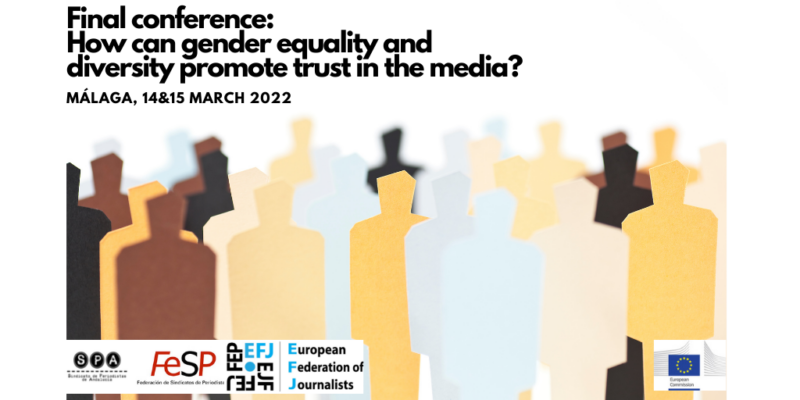Takeaway from final conference “How can gender equality and diversity promote trust in the media?”

Gender equality and diversity in the media are far from the reality, highlighted in a two-day conference organized by the European Federation of Journalists (EFJ) in cooperation with its affiliate, the Andalusian Journalists Union (SPA) and the Federation of Journalists Unions (FeSP), in Malaga on 14 and 15 March. The conference is a part of a two-year project on “Trust in media” funded by the European Commission.
The conference also called for actions from media companies to step up their efforts and responsibility to make a culture change in the newsrooms. If the media wants to maintain trust from the audience, they must make news and the newsrooms more inclusive. Rosie Parkyn (Global Director of Impact, Internews) called for a bottom-up initiative capable of engaging community and transparency proactively. Similar suggestions were offered by academic researcher Amal El Mohammadiane Tarbift who highlighted the importance of gender and human rights approach in changing audience distorted perception.
With the slogan “diversify or die” Frank Jennekens (NPO, Netherlands) emphasised that journalists must admit the unconscious bias we have and be aware of the choices we made when producing a story. One of the ways to ensure diversity and gender equality in the media is to have an inclusive workforce with more female journalists and those with diverse backgrounds, especially those at the top management positions in media companies.
According to the study presented by deputy Director of the Reuters Institute Meera Selva, there is no worldwide correlation between society and newsroom representation in terms of gender and diversity since “It is about power seen as a zero-sum game”. Concrete actions such as transparent job positions, family-friendly working conditions to achieve gender balance in the newsrooms, recommended Katrin Poetzsch (Advisory Board Member of the Bavarian Broadcast’s Equality Team). These steps can be collectively achieved by helping female leaders to do their first steps in the business: in such a sense TVE journalist Montserrat Boix Piqué sees an opportunity to implement the role of journalists’ union to make sure that competent female journalists get a chance to reach to the top.
This fight to tackle online harassment based on gender biases is one of the key assets to ensure all voices are heard by society. It is the case of Belgian journalist Florence Hainaut, who denounced “I found no support from the media I worked for, not even once.” Only sharing collective responsibility will drastically improve the situation since “As long as misogyny will be socially accepted nothing will change structurally,” she said. Indeed, the research presented by Kristin Olson from the Organization for Security and Co-operation in Europe (OSCE) proves that 73% of women journalist have experienced online violence in the course of their work: if we do not provide legal tools to ensure safety for female journalists our democracies will be affected by it. Consequently, Middlesex University professor Maja Šimunjak suggested steps needed to ensure technological and civic solutions worldwide. Among the actors, big tech companies and platforms have played an opposite role to tackle online harassment. Laia Serra Perelló, a criminal lawyer from Spain, pointed out that the business model of social media is to profit from online hate and to perpetuate the patriarchal society algorithm. Perelló said that there is a need to regulate social media and platform and make them more socially responsible.
Day two of the conference focused on the future of journalism and made the business case to have diverse and gender-equal media. Media consultant and lecturer Alexandra Borchardt highlighted the direct connection between diversity and digital transformation. Borchardt said that the biggest challenge for journalism is not to navigate this transformation but to attract a diverse talent capable of making the transformation. Andreas Marckmann Andreassen, Editor-in-Chief at Markedsføring, also echoed in his presentation that the danger of AI journalism is biased data and algorithms. This will result in the reinforcement of biased views and polarization in society. The audience will start losing trust in the media. Jenny Rönngren, Managing Editor at Feministiskt Perspektiv and Maria Ángeles Fernández González, Pikara Magazine, shared their experience of starting their own media focusing on women, moving away from the agenda of mainstream media.
New media companies and business models are emerging. Jelena Pavic Valentic, editor-in-chief of Telegram in Croatia shared how her investigative journalism is funded by subscriptions, and readers who share a passion for quality and public interest journalism paid for the content. However, Valentic also admitted that she had to face the dilemma of making the paper’s content free for the public interest or paying for their journalists to do the work.
Francisco Terron Ibañez, Secretary-General of SPA/FeSP in Spain shared some grim figures that in the last ten years, big media revenues diminished by 800 million euros, and 12.000 jobs were lost. But some new media and community media are springing up. Lars Boering, Director of the European Journalism Centre emphasized that journalists nowadays have to adapt themselves and diversify their sources of income, especially for freelancers, in order to make journalism viable for them.






